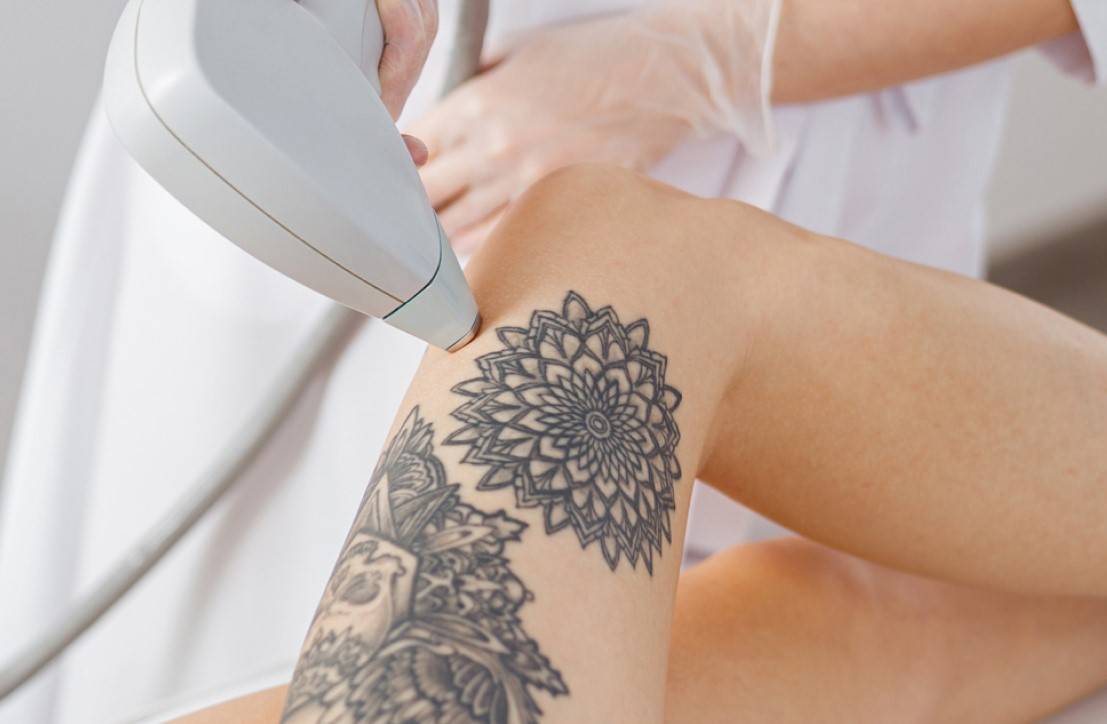Seems like you’re tired of shaving and waxing, right? It was bound to happen because both are expensive, repetitive, and time-consuming. Now that you’ve started doing your research, know that the most effective way to get rid of unwanted body hair is laser hair removal.
Yes, you heard it right.
Laser hair reduction is the best way to remove hair from any part of the body. Besides, it’s a permanent solution that saves you money and time in the long run.
All smiles with the idea that you can finally get rid of your body hair, a realisation suddenly dawned on you that you’ve got tattoos.
“Can I get laser hair removal over a tattoo?”
So if you’re wondering whether laser hair therapy will ruin your prized tattoo, let’s find out whether it’s wise to undergo laser hair removal if you have a tattoo on your skin.
How Does Laser Hair Removal Work
It’s true that laser hair removal offers a permanent solution to body hair. However, it doesn’t happen in a session or two. Why? To understand that, you need to know that there are three stages of hair growth, which are:
- Anagen (growth)
- Catagen (transition)
- Telogen (rest)
The Anagen phase, also known as the growth or active phase, is when the hair follicle grows and begins to create the hair fibre while taking on the appearance of an onion. Beginning with the conclusion of the Anagen phase and the period when the hair enters quiescence, is the Catagen phase. The hair is said to be resting during the next stage, known as the Telogen phase, since the hair follicle is in a dormant state.
As they are in the early Anagen phase, only around 30% of the body hair may be treated with laser in a single session. It should be understood that once the remaining hair reaches the early Anagen phase, they will be able to absorb the laser. Therefore, one should be aware that around 20 to 30 percent of the hair might be destroyed in one try. Resuming laser treatment after 1-2 months have elapsed and the remaining hair has entered the early Anagen phase. Because not all hairs can absorb the laser at once, it takes around 5–6 sessions to decrease hair on any portion of the body.
On the other side, you could require 6–12 sessions if there is a stimulus of any type, such as PCOS or a medication response, that is promoting undesired hair growth. In order for the therapy to proceed in accordance with the results and the agreement of the patient, it is crucial to establish a good relationship with the doctor. When the hair is thicker and darker, laser treatment is most effective. The laser acts on the dark melanin pigment in this manner, completely killing the root. These hairs do not grow back as a result. Once the hair reaches the Anagen phase, more laser therapy kills the remaining hair, and eventually all of the roots are removed. Even if the root is semi-damaged, it won’t bother you as it produces very thin hair.
That’s how laser hair therapy reduces body hair with time.
Why Laser Hair Reduction Is not Recommended on Tattooed Skin
A certified technician will always say “no”, when it comes to laser hair removal on tattooed skin. Wait, there’s a logical reason behind it. In reality, it’s the pigments in the hair that draw the light energy. As a result, the hair follicles get damaged after the light energy is transformed into thermal energy, which stops hair growth.
Laser hair removal is most successful for people with a light complexion and dark hair, although it also works on those with dark skin and light hair. However, tanning will stimulate the skin, which might interfere with the therapy since the natural pigmentation will alter. A similar problem will arise if lasers are used on skin with tattoos.
Tattoos actually remain in the skin as pigment. As a result, the laser will be drawn to the ink, which might have negative effects due to the excessive generation of heat. A laser treatment over a tattoo may not only be uncomfortable, but it may also result in burns, fading, or even deformation of the tattoo.
It can even cause blisters and permanently damage the tattoo. And, it will take a long time to heal. That’s why, when people get laser hair reduction close to a tattooed surface, the technicians take extra precaution to prevent any reaction because of tattoo pigmentation. If you are still thinking about booking the best laser hair removal service in your area, you will have to get therapy around the tattoo to avoid any negative reactions.
Difference Between Laser Hair Removal and Laser Tattoo Removal
It should be clear by now that laser hair removal on tattooed skin will not only damage the tattoo but the skin too. Since both laser hair reduction and laser tattoo removal involve the usage of tattoos, it could be easy to confuse them with each other.
Yes, both treatments use lasers, but their intensities are different. The lasers used for removing the ink will break the particles. On the other hand, the laser will damage the hair follicle and remove any artificial colour, besides causing burns or blisters on the skin.
Patients must keep in mind that laser tattoo removal is a totally separate operation with a different objective and unique features, despite the fact that it may be tempting to believe otherwise. Numerous types of lasers, including alexandrite, ND: YAG, diode, and others, are used to remove hair. Q-Switch lasers, which provide energy considerably more quickly, are used to remove tattoos. When the laser strikes the pigment, it causes it to break apart.
Can People With Tattoo Still Get Laser Hair treatments?
Yes, they can. However, it needs to be understood that the position of the tattoo will determine if the procedure is feasible. For instance, your tattoo on your forearms won’t be damaged if you opt to laser your underarms. In short, the area of the tattooed skin needs to be avoided to prevent any damage to the skin and the tattoo.
Is it Okay to Get a Tattoo After Laser Hair Removal?
Yes, it’s okay to get a tattoo after laser hair reduction. However, the wise thing to do would be to wait until you complete all the session of laser hair removal. The completion of all the sessions will reduce your body hair up to 90%. It should be noted that the gap between laser therapy sessions varies from person to person because of their hair growth.
Apart from the fact that it may impact the results of the treatment, it may affect the area you choose, plus hormonal conditions may require more sessions. Hence, the wise thing would be to wait until the completion of the laser hair sessions before deciding to get a tattoo. Also, you will have to give the skin some time to heal before you can get a tattoo. The right way is to wait a few weeks before going to the tattoo artist to get a tattoo.
Lastly, when you’re looking for a permanent solution to unwanted body hair, make sure to go to a clinic that is reputed for offering laser hair removal services.

HEY ! I’m Nil (Founder of OnlineDrifts.com), Digital Marketer, Affiliate Marketer and a blogger writing about blogging tips, SEO, Tech Tips etc.

